Use divideandconquer technique with complexity of Onlog23 to
Use divide-and-conquer technique (with complexity of O(nlog23)) to calculate 4158*1324. Please show the steps. You can exit the recursion when you compute the 2-digit number multiplications (that is, you can assume that any 2-digit number multiplications can be directly calculated).
Solution
Following is C++ implementation of above algorithm.
// C++ implementation of Karatsuba algorithm for bit string multiplication.
#include<iostream>
#include<stdio.h>
using namespace std;
// FOLLOWING TWO FUNCTIONS ARE COPIED FROM http://goo.gl/q0OhZ
// Helper method: given two unequal sized bit strings, converts them to
// same length by adding leading 0s in the smaller string. Returns the
// the new length
int makeEqualLength(string &str1, string &str2)
{
int len1 = str1.size();
int len2 = str2.size();
if (len1 < len2)
{
for (int i = 0 ; i < len2 - len1 ; i++)
str1 = \'0\' + str1;
return len2;
}
else if (len1 > len2)
{
for (int i = 0 ; i < len1 - len2 ; i++)
str2 = \'0\' + str2;
}
return len1; // If len1 >= len2
}
// The main function that adds two bit sequences and returns the addition
string addBitStrings( string first, string second )
{
string result; // To store the sum bits
// make the lengths same before adding
int length = makeEqualLength(first, second);
int carry = 0; // Initialize carry
// Add all bits one by one
for (int i = length-1 ; i >= 0 ; i--)
{
int firstBit = first.at(i) - \'0\';
int secondBit = second.at(i) - \'0\';
// boolean expression for sum of 3 bits
int sum = (firstBit ^ secondBit ^ carry)+\'0\';
result = (char)sum + result;
// boolean expression for 3-bit addition
carry = (firstBit&secondBit) | (secondBit&carry) | (firstBit&carry);
}
// if overflow, then add a leading 1
if (carry) result = \'1\' + result;
return result;
}
// A utility function to multiply single bits of strings a and b
int multiplyiSingleBit(string a, string b)
{ return (a[0] - \'0\')*(b[0] - \'0\'); }
// The main function that multiplies two bit strings X and Y and returns
// result as long integer
long int multiply(string X, string Y)
{
// Find the maximum of lengths of x and Y and make length
// of smaller string same as that of larger string
int n = makeEqualLength(X, Y);
// Base cases
if (n == 0) return 0;
if (n == 1) return multiplyiSingleBit(X, Y);
int fh = n/2; // First half of string, floor(n/2)
int sh = (n-fh); // Second half of string, ceil(n/2)
// Find the first half and second half of first string.
// Refer http://goo.gl/lLmgn for substr method
string Xl = X.substr(0, fh);
string Xr = X.substr(fh, sh);
// Find the first half and second half of second string
string Yl = Y.substr(0, fh);
string Yr = Y.substr(fh, sh);
// Recursively calculate the three products of inputs of size n/2
long int P1 = multiply(Xl, Yl);
long int P2 = multiply(Xr, Yr);
long int P3 = multiply(addBitStrings(Xl, Xr), addBitStrings(Yl, Yr));
// Combine the three products to get the final result.
return P1*(1<<(2*sh)) + (P3 - P1 - P2)*(1<<sh) + P2;
}
// Driver program to test aboev functions
int main()
{
printf (\"%ld\ \", multiply(\"1100\", \"1010\"));
printf (\"%ld\ \", multiply(\"110\", \"1010\"));
printf (\"%ld\ \", multiply(\"11\", \"1010\"));
printf (\"%ld\ \", multiply(\"1\", \"1010\"));
printf (\"%ld\ \", multiply(\"0\", \"1010\"));
printf (\"%ld\ \", multiply(\"111\", \"111\"));
printf (\"%ld\ \", multiply(\"11\", \"11\"));
}
| // C++ implementation of Karatsuba algorithm for bit string multiplication. #include<iostream> #include<stdio.h> using namespace std; // FOLLOWING TWO FUNCTIONS ARE COPIED FROM http://goo.gl/q0OhZ // Helper method: given two unequal sized bit strings, converts them to // same length by adding leading 0s in the smaller string. Returns the // the new length int makeEqualLength(string &str1, string &str2) { int len1 = str1.size(); int len2 = str2.size(); if (len1 < len2) { for (int i = 0 ; i < len2 - len1 ; i++) str1 = \'0\' + str1; return len2; } else if (len1 > len2) { for (int i = 0 ; i < len1 - len2 ; i++) str2 = \'0\' + str2; } return len1; // If len1 >= len2 } // The main function that adds two bit sequences and returns the addition string addBitStrings( string first, string second ) { string result; // To store the sum bits // make the lengths same before adding int length = makeEqualLength(first, second); int carry = 0; // Initialize carry // Add all bits one by one for (int i = length-1 ; i >= 0 ; i--) { int firstBit = first.at(i) - \'0\'; int secondBit = second.at(i) - \'0\'; // boolean expression for sum of 3 bits int sum = (firstBit ^ secondBit ^ carry)+\'0\'; result = (char)sum + result; // boolean expression for 3-bit addition carry = (firstBit&secondBit) | (secondBit&carry) | (firstBit&carry); } // if overflow, then add a leading 1 if (carry) result = \'1\' + result; return result; } // A utility function to multiply single bits of strings a and b int multiplyiSingleBit(string a, string b) { return (a[0] - \'0\')*(b[0] - \'0\'); } // The main function that multiplies two bit strings X and Y and returns // result as long integer long int multiply(string X, string Y) { // Find the maximum of lengths of x and Y and make length // of smaller string same as that of larger string int n = makeEqualLength(X, Y); // Base cases if (n == 0) return 0; if (n == 1) return multiplyiSingleBit(X, Y); int fh = n/2; // First half of string, floor(n/2) int sh = (n-fh); // Second half of string, ceil(n/2) // Find the first half and second half of first string. // Refer http://goo.gl/lLmgn for substr method string Xl = X.substr(0, fh); string Xr = X.substr(fh, sh); // Find the first half and second half of second string string Yl = Y.substr(0, fh); string Yr = Y.substr(fh, sh); // Recursively calculate the three products of inputs of size n/2 long int P1 = multiply(Xl, Yl); long int P2 = multiply(Xr, Yr); long int P3 = multiply(addBitStrings(Xl, Xr), addBitStrings(Yl, Yr)); // Combine the three products to get the final result. return P1*(1<<(2*sh)) + (P3 - P1 - P2)*(1<<sh) + P2; } // Driver program to test aboev functions int main() { printf (\"%ld\ \", multiply(\"1100\", \"1010\")); printf (\"%ld\ \", multiply(\"110\", \"1010\")); printf (\"%ld\ \", multiply(\"11\", \"1010\")); printf (\"%ld\ \", multiply(\"1\", \"1010\")); printf (\"%ld\ \", multiply(\"0\", \"1010\")); printf (\"%ld\ \", multiply(\"111\", \"111\")); printf (\"%ld\ \", multiply(\"11\", \"11\")); } |
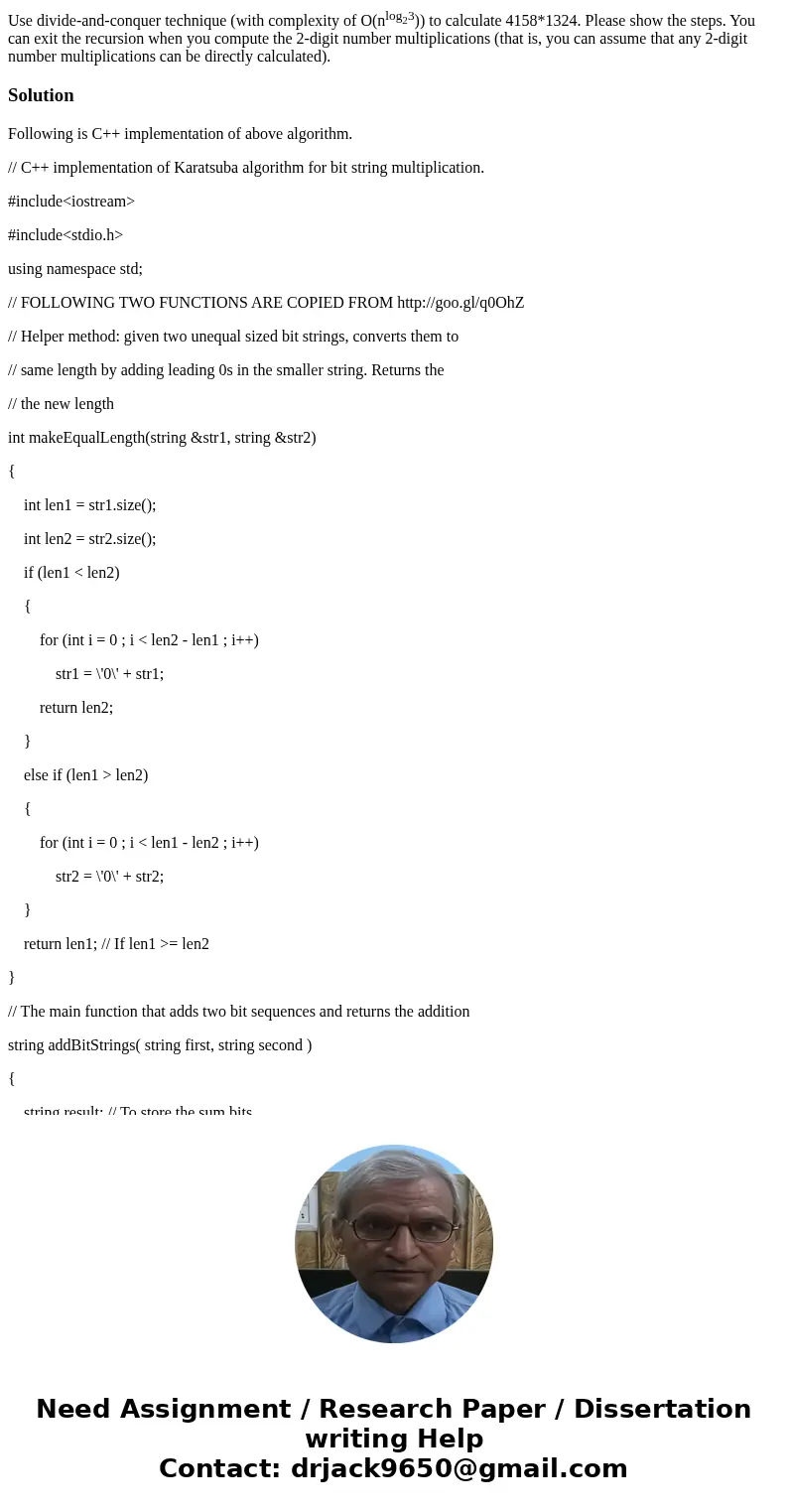
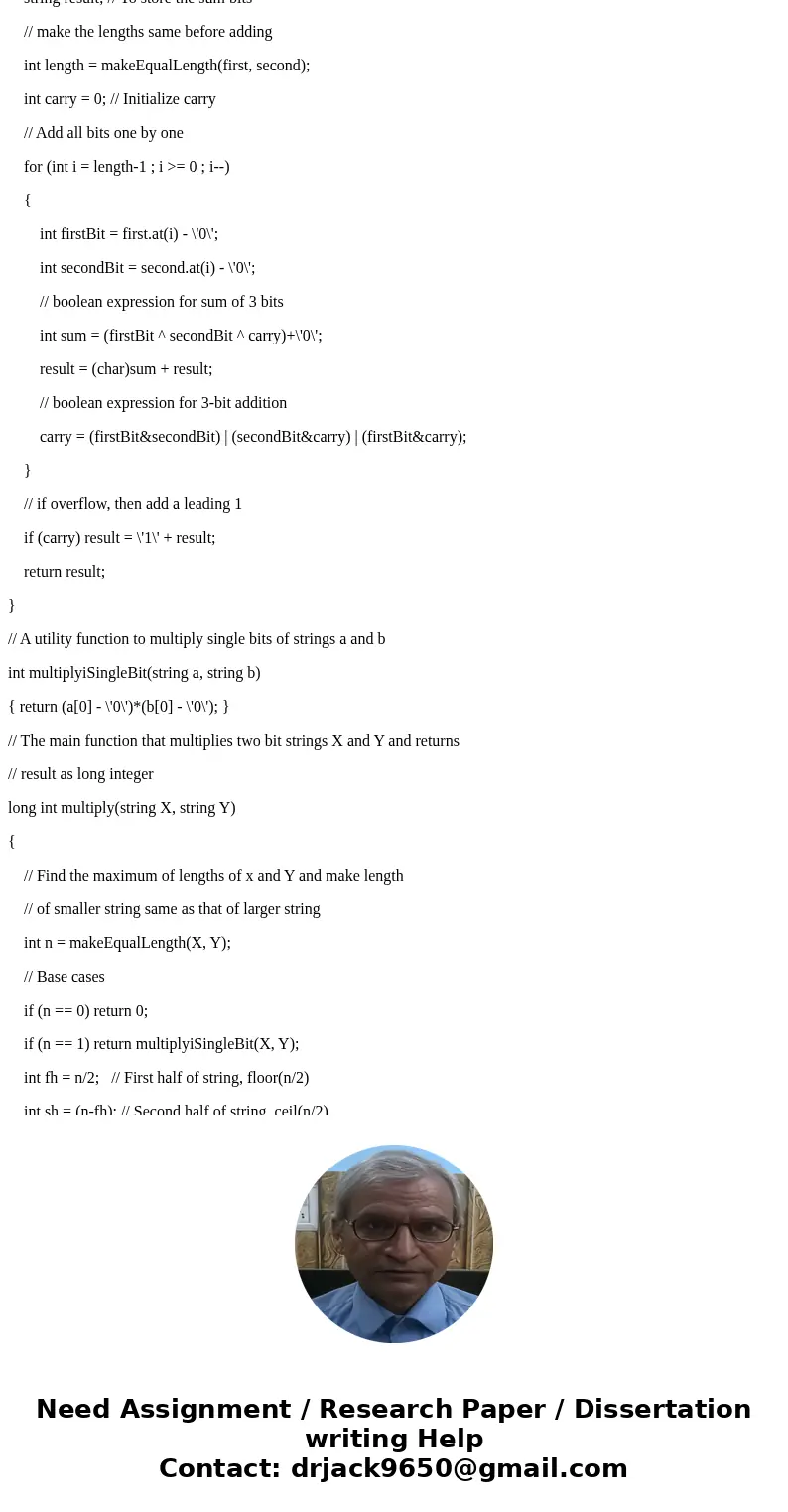
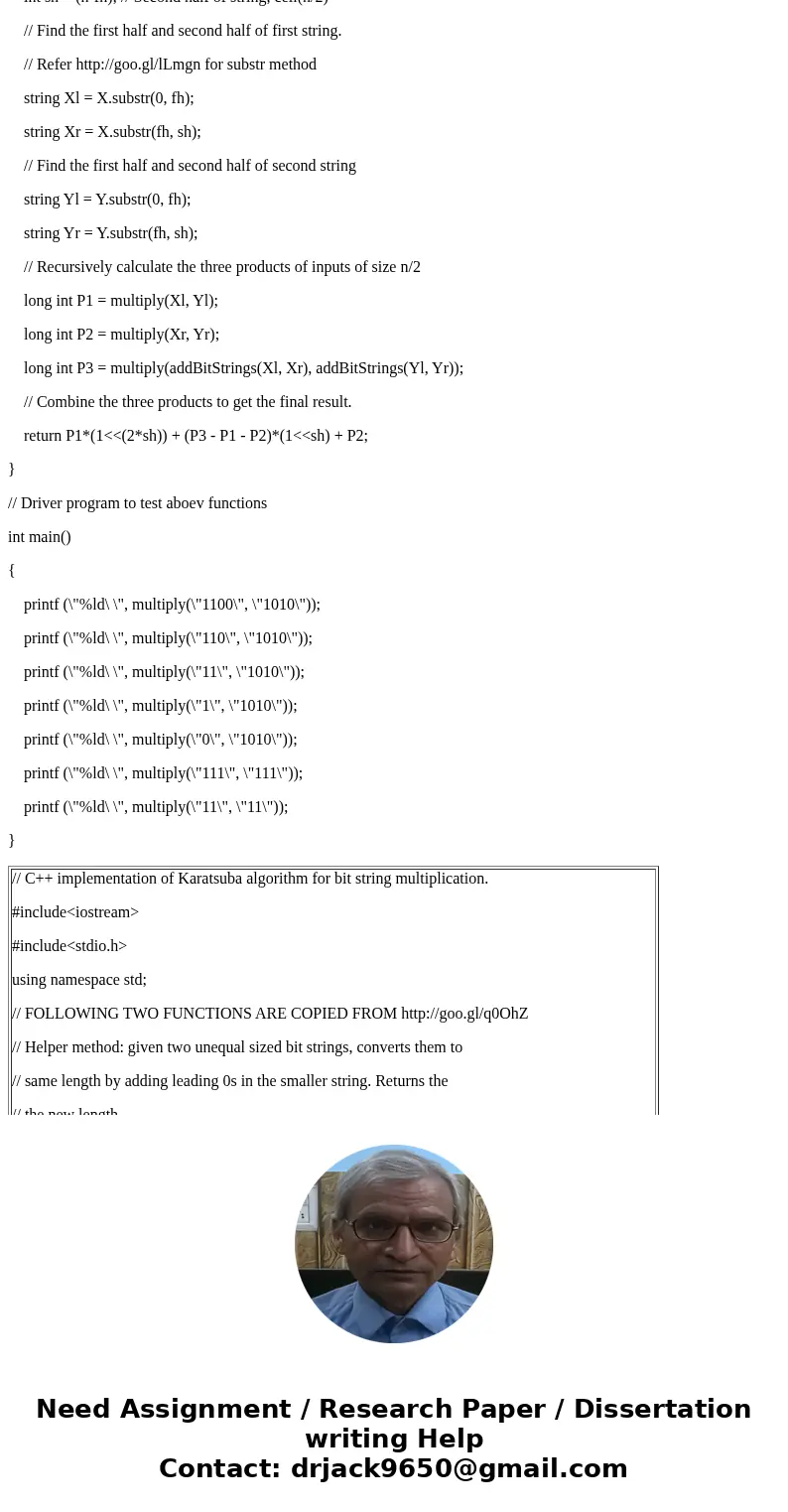
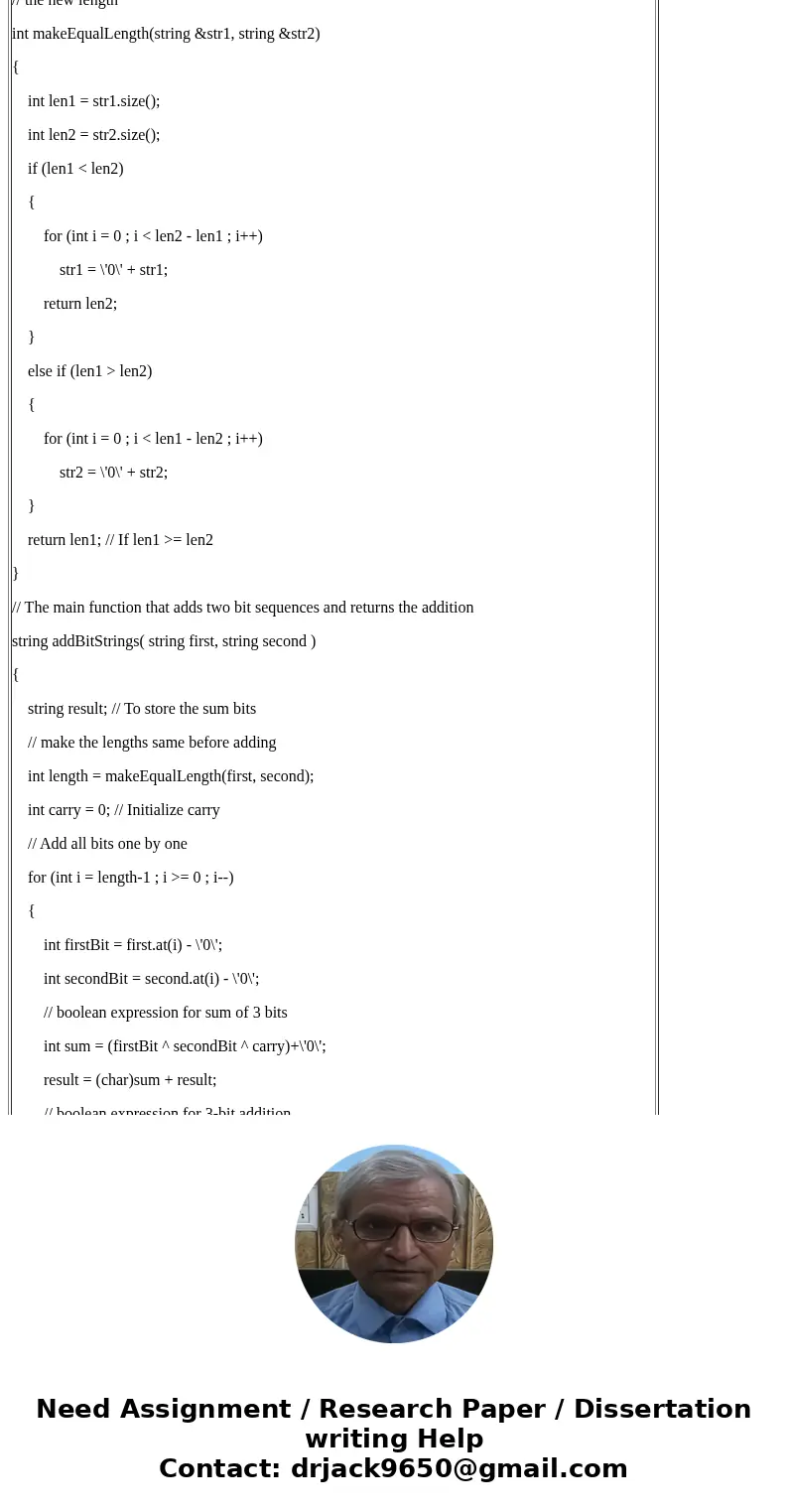
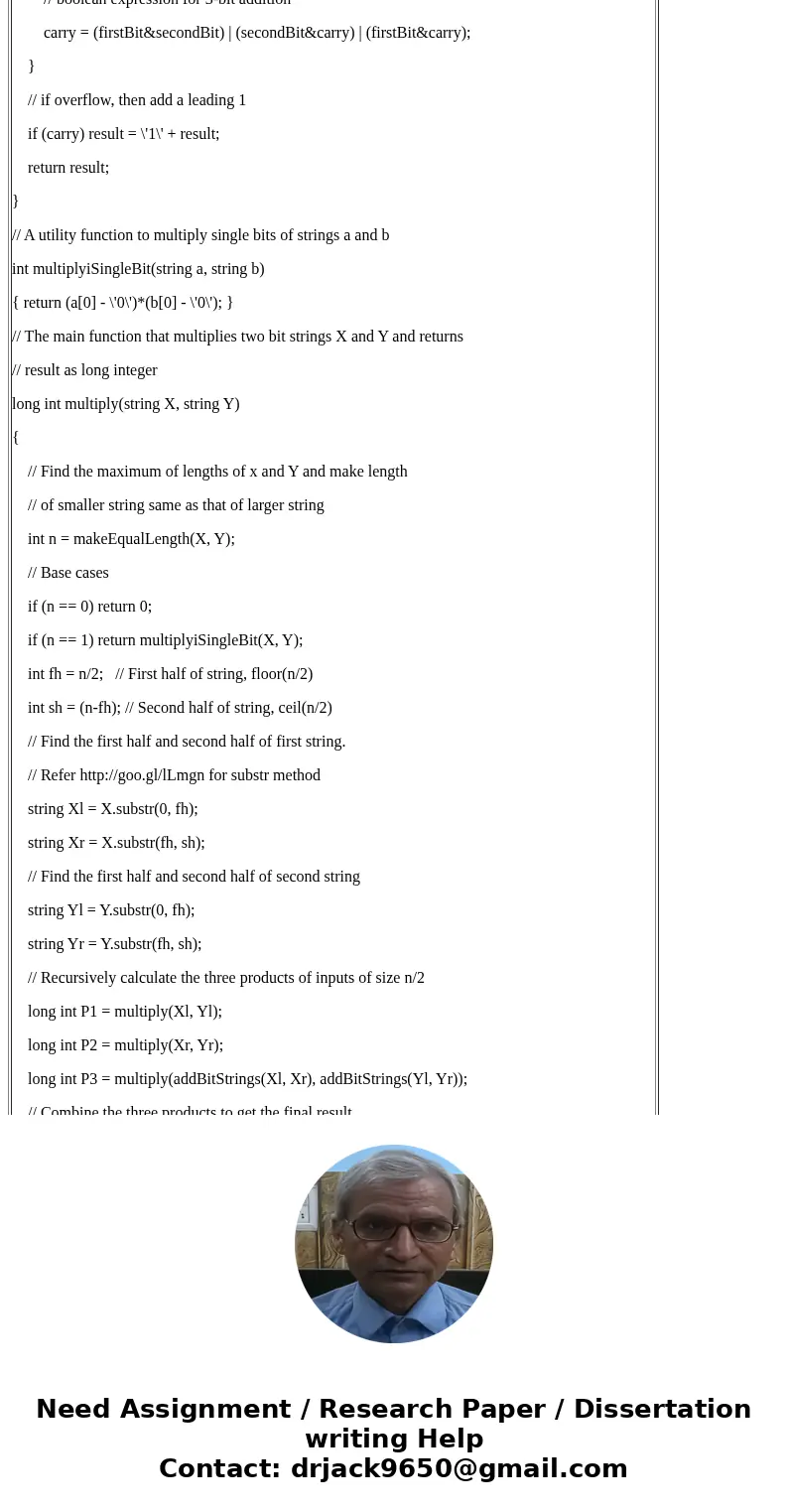
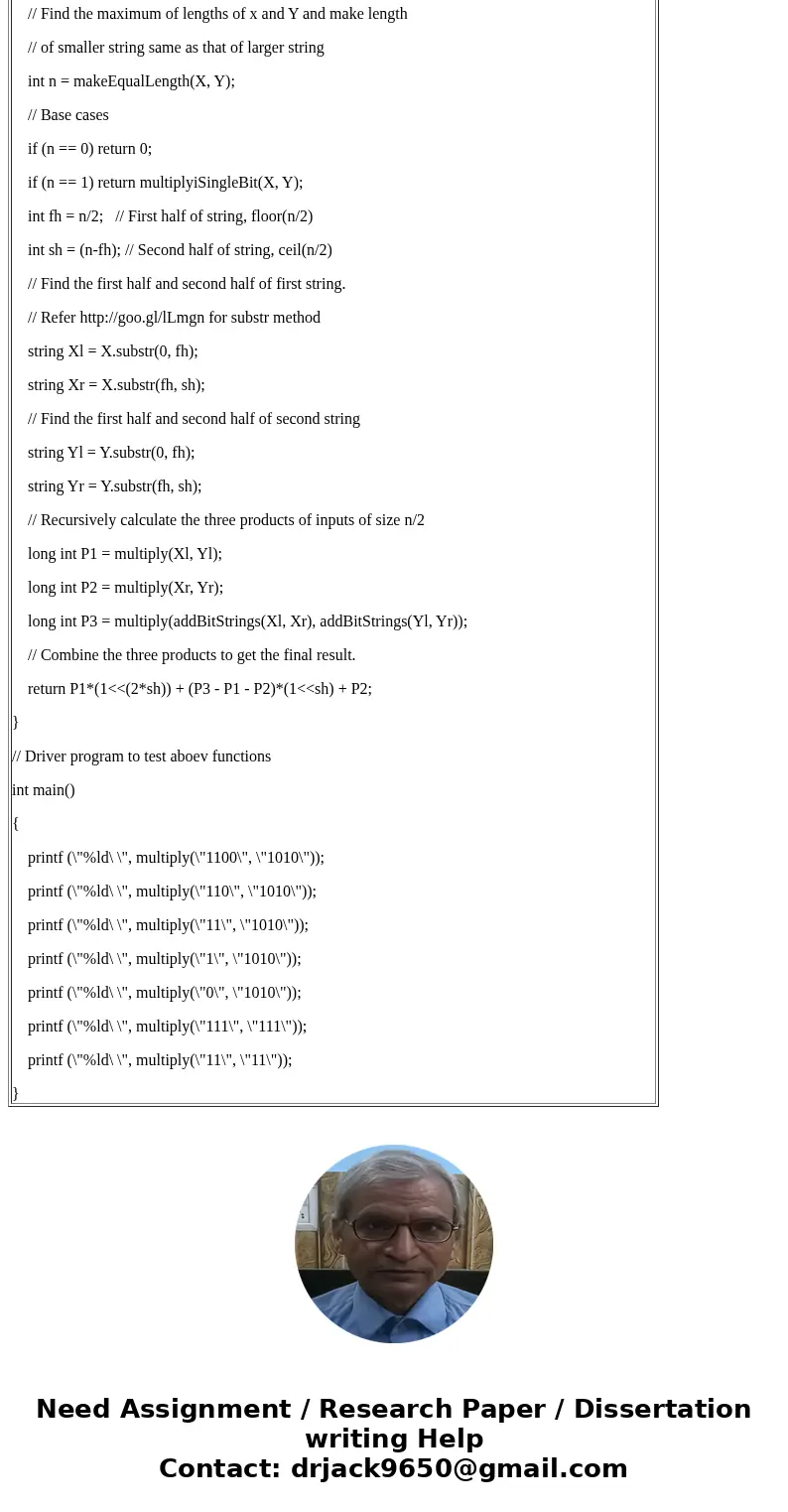
 Homework Sourse
Homework Sourse